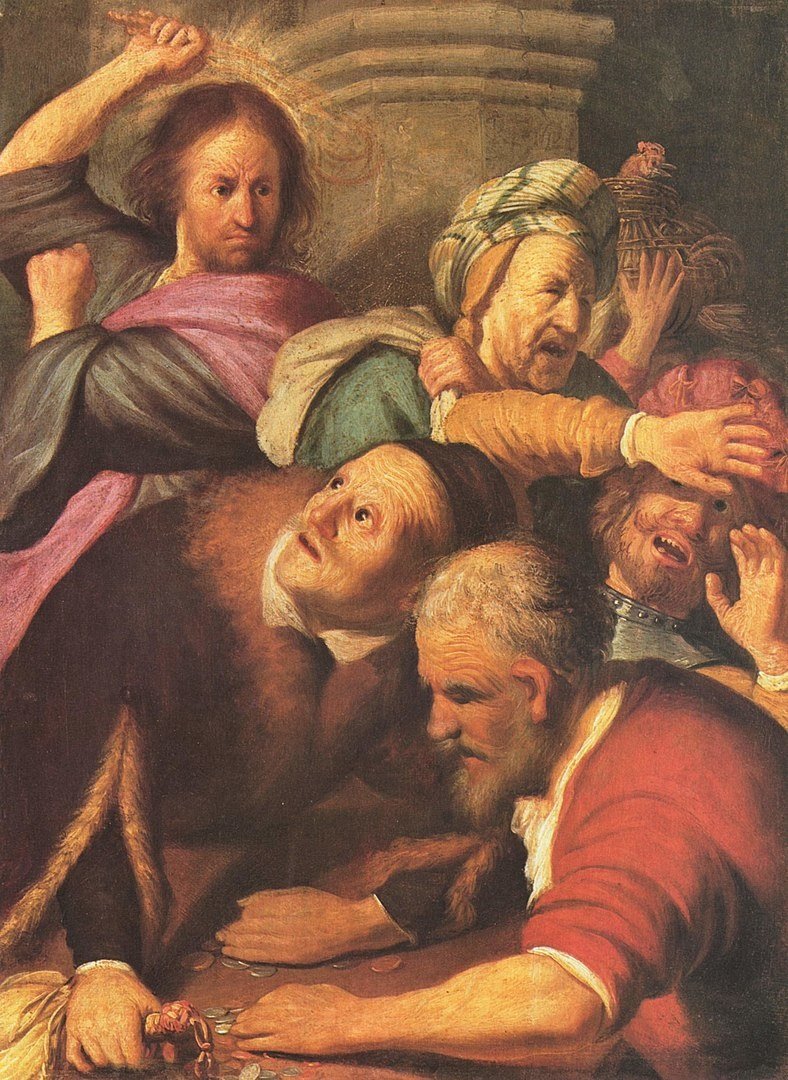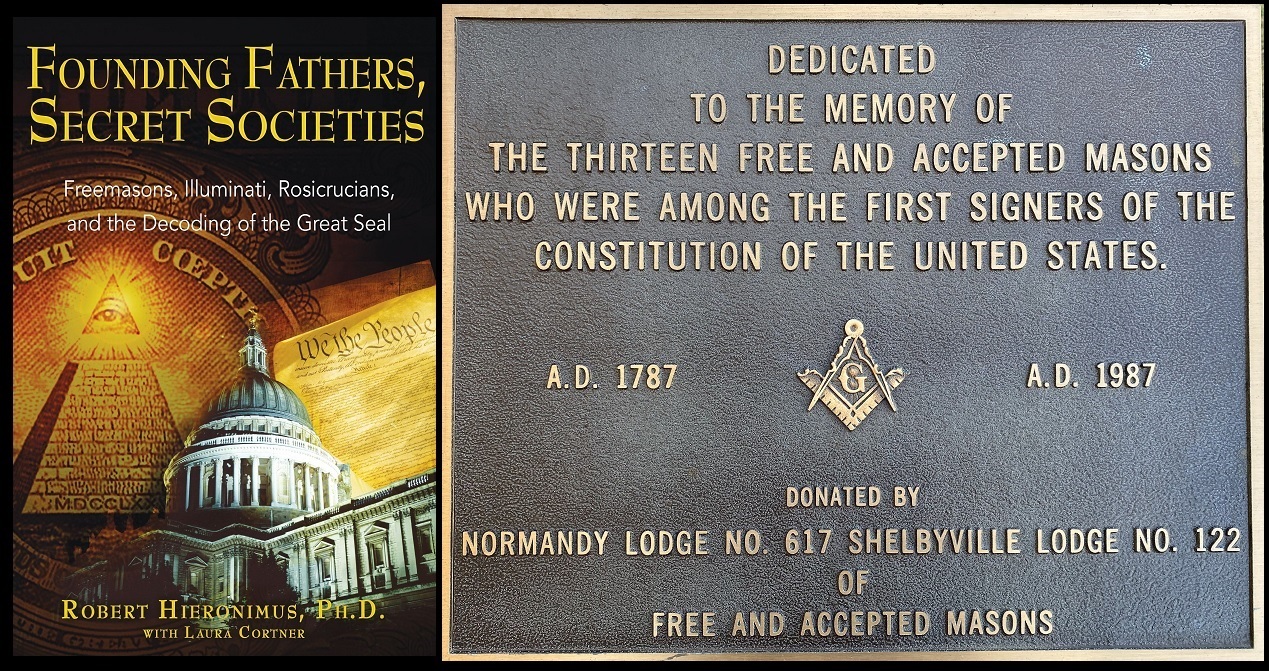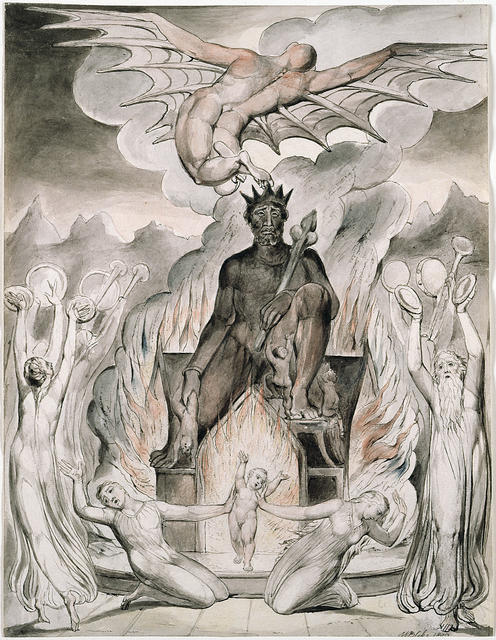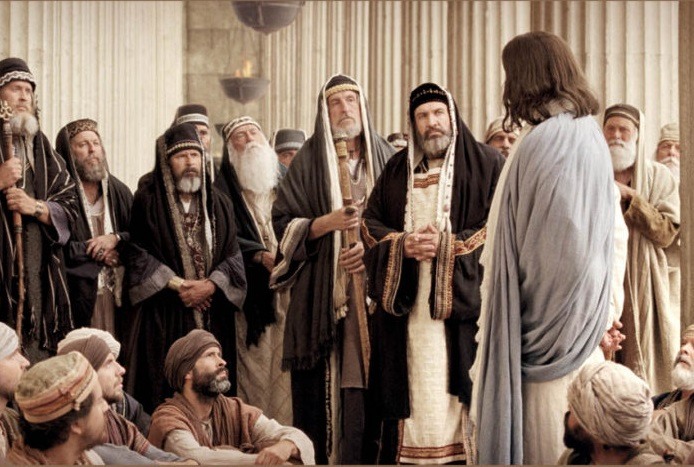
Jesus confronts Jewish Leaders in the Temple. Original image source unknown (looks like a screenshot from a film.)
by Brian Shilhavy
Editor, Health Impact News
One of the most common myths taught in Christianity today, and since the “Reformation” period in Europe in the 1700s, is that believers in Jesus Christ are taught to always obey our government.
The passage in the New Testament part of the Bible that is used by pastors and other Christian “leaders” today to try and convince people that they need to always obey their government, is from Paul’s letter written to the congregations who were in Rome at the time.
Every person is to be subject to the governing authorities, for there is no authority except that which God has established.
The authorities that exist have been established by God.
Consequently, he who rebels against the authority is rebelling against what God has instituted, and those who do so will bring judgment on themselves.
For rulers hold no terror for those who do right, but for those who do wrong. Do you want to be free from fear of the one in authority?
Then do what is right and he will commend you. For he is God’s servant to do you good.
But if you do wrong, be afraid, for he does not bear the sword for nothing. He is God’s servant, an agent of wrath to bring punishment on the wrongdoer.
Therefore, it is necessary to submit to the authorities, not only because of possible punishment but also because of conscience.
This is also why you pay taxes, for the authorities are God’s servants, who give their full time to governing. Give everyone what you owe him: If you owe taxes, pay taxes; if revenue, then revenue; if respect, then respect; if honor, then honor. (Romans 13:1-7)
The first thing one must do to understand this passage, is consider who these instructions were written to, and what their situation was that prompted Paul to write a letter to these congregations, which included this passage at the beginning of the 13th chapter.
Who were the People that this Letter was Sent to?

The letter was written to “all those in Rome who are loved by God and called to be saints.” (Romans 1:7)
These believers lived in Rome, the capital of the Roman Empire. They were mostly Jews, but also some Gentiles, who believed that Jesus Christ was the Messiah, and had risen from the dead.
Paul had as of yet never visited Rome when he wrote this, so he was writing to people whom he had never met yet, but only heard about.
So his letter is an exposé on the Good News (Gospel) regarding the New Covenant that Jesus fulfilled as the Jewish Messiah.
It is a masterpiece in ancient literature.
What was Happening in Rome that Prompted What Paul Wrote in the Beginning of Chapter 13?
We know from the biblical literature that Jews were at odds with the Roman Government during the 1st Century.
In Acts 16, Paul mentioned that some fellow believing Jews from Rome had joined him, because they were forced to leave Rome by the Roman Emperor Claudius.
And he found a Jew named Aquila, a native of Pontus, recently come from Italy with his wife Priscilla, because Claudius had commanded all the Jews to leave Rome. (Acts 18:2)
From the historical records, we know that the conflict between the Roman government and the Jews accelerated after Claudius was poisoned, and the Emperor Nero took his place. There had been a massive fire in the city of Rome, and Nero blamed it on the Jews.
Many of the Jews were revolting against Rome, whose empire at that time included occupying Israel, and many of these Jews were among a political faction of Jews referred to as “Zealots.”
The Zealots were a group of Jews who began to emerge as a religious/political movement around the beginning of the 1st century CE.
They strongly opposed Roman rule and turned on everyone, including other Jews, who cooperated with Rome. A subgroup of them, known as the Sicarii, frequently attacked Romans and those considered to work for them.
The Zealots emerged as a religious/political movement in the 1st century CE. Most of our information about the Zealots comes from the Jewish historian, Flavius Josephus (36-100 CE), who was also an eyewitness to the Great Jewish Revolt of 66 CE.
In both The Antiquities of the Jews and The Jewish War, Josephus described the various Jewish sects of schools of philosophy.
The Zealots were called “the fourth sect.” According to Josephus, the movement began with Judas of Galilee, who, along with Zadok the Pharisee, founded the fourth sect.
When a new Roman governor, Quirinius, was appointed in Syria who also oversaw activities in Judea, these two led a tax revolt in the year 6 CE. This was the census mentioned in Luke’s nativity story. (Source.)
The Zealots believed that Israel should never cooperate with countries who oppressed them, but that they should seek to overthrow their government.
We know that there was at least one Zealot who was listed among the 12 apostles who followed Jesus:
And when day came, he called his disciples and chose from them twelve, whom he named apostles: Simon, whom he named Peter, and Andrew his brother, and James and John, and Philip, and Bartholomew, and Matthew, and Thomas, and James the son of Alphaeus, and Simon who was called the Zealot, and Judas the son of James, and Judas Iscariot, who became a traitor. (Luke 6:13-16)
Barabbas, who is described as “a notorious prisoner” and was chosen to be released from prison to go free in place of Jesus who was condemned to death (see Matthew chapter 27), is also thought to have been a Zealot, as well as the two “thieves” who were executed on crosses beside Jesus.
The apostle Paul, who wrote this letter to the believers in Rome, was in fact probably also a Zealot at one time, as he was a member of the ruling class of evil Jews in the Pharisee Party, and participated in murdering and putting Jews in prison who had believed in Jesus, before he himself met Jesus and converted to a believing Jew.
I am a Jew, born in Tarsus in Cilicia, but brought up in this city, educated at the feet of Gamaliel according to the strict manner of the law of our fathers, being zealous for God as all of you are this day. (Acts 22:3)
So understanding the historical background, and understanding the situation in Rome at that time that probably prompted Paul to write what he wrote in the first 7 verses of Romans 13, it would appear that he is addressing this political Jewish belief held by the Zealots (and others), and letting them know that it was wrong to seek the overthrow of the Roman government by force.
But does that mean that all believers should always obey the government?
Examples from Godly Jews during the Babylonian Occupation

We actually have a parallel period in the history of the Jewish people that we can look at to help answer this question, and that is the period of the Babylonian occupation of Jerusalem in the 6th Century B.C.
The prophet Jeremiah prophesied and warned the people NOT to resist the Babylonian invading armies, because God was not with them and was judging them through the Babylonian King and his forces.
He actually told the people to live in the land of their occupiers and seek the “peace and prosperity” of the land where they were being taken to as captives.
This is what the LORD Almighty, the God of Israel, says to all those I carried into exile from Jerusalem to Babylon:
“Build houses and settle down; plant gardens and eat what they produce. Marry and have sons and daughters; find wives for your sons and give your daughters in marriage, so that they too may have sons and daughters.
Increase in number there; do not decrease. Also, seek the peace and prosperity of the city to which I have carried you into exile. Pray to the LORD for it, because if it prospers, you too will prosper.” (Jeremiah 29:4-7)
Daniel and others from the Royal Family, the family of King David, took this prophecy to heart, and served in the Babylonian government.
They soon reached prominent positions within the government of the King, but they did not always obey the laws of the King.
King Nebuchadnezzar made an image of gold, ninety feet high and nine feet wide, and set it up on the plain of Dura in the province of Babylon.
He then summoned the satraps, prefects, governors, advisers, treasurers, judges, magistrates and all the other provincial officials to come to the dedication of the image he had set up.
So the satraps, prefects, governors, advisers, treasurers, judges, magistrates and all the other provincial officials assembled for the dedication of the image that King Nebuchadnezzar had set up, and they stood before it.
Then the herald loudly proclaimed, “This is what you are commanded to do, O peoples, nations and men of every language: As soon as you hear the sound of the horn, flute, zither, lyre, harp, pipes and all kinds of music, you must fall down and worship the image of gold that King Nebuchadnezzar has set up.
Whoever does not fall down and worship will immediately be thrown into a blazing furnace.”
Therefore, as soon as they heard the sound of the horn, flute, zither, lyre, harp and all kinds of music, all the peoples, nations and men of every language fell down and worshiped the image of gold that King Nebuchadnezzar had set up.
At this time some astrologers came forward and denounced the Jews.
They said to King Nebuchadnezzar, “O king, live forever! You have issued a decree, O king, that everyone who hears the sound of the horn, flute, zither, lyre, harp, pipes and all kinds of music must fall down and worship the image of gold, and that whoever does not fall down and worship will be thrown into a blazing furnace.
But there are some Jews whom you have set over the affairs of the province of Babylon—Shadrach, Meshach and Abednego—who pay no attention to you, O king.
They neither serve your gods nor worship the image of gold you have set up.”
Furious with rage, Nebuchadnezzar summoned Shadrach, Meshach and Abednego.
So these men were brought before the king, and Nebuchadnezzar said to them, “Is it true, Shadrach, Meshach and Abednego, that you do not serve my gods or worship the image of gold I have set up? Now when you hear the sound of the horn, flute, zither, lyre, harp, pipes and all kinds of music, if you are ready to fall down and worship the image I made, very good.
But if you do not worship it, you will be thrown immediately into a blazing furnace. Then what god will be able to rescue you from my hand?”
Shadrach, Meshach and Abednego replied to the king, “O Nebuchadnezzar, we do not need to defend ourselves before you in this matter. If we are thrown into the blazing furnace, the God we serve is able to save us from it, and he will rescue us from your hand, O king.
But even if he does not, we want you to know, O king, that we will not serve your gods or worship the image of gold you have set up.”
Then Nebuchadnezzar was furious with Shadrach, Meshach and Abednego, and his attitude toward them changed. He ordered the furnace heated seven times hotter than usual and commanded some of the strongest soldiers in his army to tie up Shadrach, Meshach and Abednego and throw them into the blazing furnace.
So these men, wearing their robes, trousers, turbans and other clothes, were bound and thrown into the blazing furnace.
The king’s command was so urgent and the furnace so hot that the flames of the fire killed the soldiers who took up Shadrach, Meshach and Abednego, and these three men, firmly tied, fell into the blazing furnace.
Then King Nebuchadnezzar leaped to his feet in amazement and asked his advisers, “Weren’t there three men that we tied up and threw into the fire?”
They replied, “Certainly, O king.”
He said, “Look! I see four men walking around in the fire, unbound and unharmed, and the fourth looks like a son of the gods.”
Nebuchadnezzar then approached the opening of the blazing furnace and shouted, “Shadrach, Meshach and Abednego, servants of the Most High God, come out! Come here!”
So Shadrach, Meshach and Abednego came out of the fire, and the satraps, prefects, governors and royal advisers crowded around them.
They saw that the fire had not harmed their bodies, nor was a hair of their heads singed; their robes were not scorched, and there was no smell of fire on them.
Then Nebuchadnezzar said, “Praise be to the God of Shadrach, Meshach and Abednego, who has sent his angel and rescued his servants! They trusted in him and defied the king’s command and were willing to give up their lives rather than serve or worship any god except their own God.
Therefore I decree that the people of any nation or language who say anything against the God of Shadrach, Meshach and Abednego be cut into pieces and their houses be turned into piles of rubble, for no other god can save in this way.”
Then the king promoted Shadrach, Meshach and Abednego in the province of Babylon. (Daniel 3:1-30)
Then there is the famous story of Daniel himself, who at times was elevated politically to second in command just under the current ruling King, but one day found himself in a position where he could NOT obey the government’s laws.
It pleased Darius to appoint 120 satraps to rule throughout the kingdom, with three administrators over them, one of whom was Daniel.
The satraps were made accountable to them so that the king might not suffer loss.
Now Daniel so distinguished himself among the administrators and the satraps by his exceptional qualities that the king planned to set him over the whole kingdom.
At this, the administrators and the satraps tried to find grounds for charges against Daniel in his conduct of government affairs, but they were unable to do so.
They could find no corruption in him, because he was trustworthy and neither corrupt nor negligent.
Finally these men said, “We will never find any basis for charges against this man Daniel unless it has something to do with the law of his God.”
So the administrators and the satraps went as a group to the king and said: “O King Darius, live forever! The royal administrators, prefects, satraps, advisers and governors have all agreed that the king should issue an edict and enforce the decree that anyone who prays to any god or man during the next thirty days, except to you, O king, shall be thrown into the lions’ den.
Now, O king, issue the decree and put it in writing so that it cannot be altered—in accordance with the laws of the Medes and Persians, which cannot be repealed.”
So King Darius put the decree in writing.
Now when Daniel learned that the decree had been published, he went home to his upstairs room where the windows opened toward Jerusalem. Three times a day he got down on his knees and prayed, giving thanks to his God, just as he had done before.
(Editor’s note: If this isn’t blatant defiance of a Government Law, then I don’t what is!)
Then these men went as a group and found Daniel praying and asking God for help.
So they went to the king and spoke to him about his royal decree: “Did you not publish a decree that during the next thirty days anyone who prays to any god or man except to you, O king, would be thrown into the lions’ den?”
The king answered, “The decree stands—in accordance with the laws of the Medes and Persians, which cannot be repealed.”
Then they said to the king, “Daniel, who is one of the exiles from Judah, pays no attention to you, O king, or to the decree you put in writing. He still prays three times a day.”
When the king heard this, he was greatly distressed; he was determined to rescue Daniel and made every effort until sundown to save him.
Then the men went as a group to the king and said to him, “Remember, O king, that according to the law of the Medes and Persians no decree or edict that the king issues can be changed.”
So the king gave the order, and they brought Daniel and threw him into the lions’ den.
The king said to Daniel, “May your God, whom you serve continually, rescue you!”
A stone was brought and placed over the mouth of the den, and the king sealed it with his own signet ring and with the rings of his nobles, so that Daniel’s situation might not be changed.
Then the king returned to his palace and spent the night without eating and without any entertainment being brought to him. And he could not sleep.
At the first light of dawn, the king got up and hurried to the lions’ den.
When he came near the den, he called to Daniel in an anguished voice, “Daniel, servant of the living God, has your God, whom you serve continually, been able to rescue you from the lions?”
Daniel answered, “O king, live forever! My God sent his angel, and he shut the mouths of the lions. They have not hurt me, because I was found innocent in his sight. Nor have I ever done any wrong before you, O king.”
The king was overjoyed and gave orders to lift Daniel out of the den. And when Daniel was lifted from the den, no wound was found on him, because he had trusted in his God.
At the king’s command, the men who had falsely accused Daniel were brought in and thrown into the lions’ den, along with their wives and children.
And before they reached the floor of the den, the lions overpowered them and crushed all their bones.
Then King Darius wrote to all the peoples, nations and men of every language throughout the land: “May you prosper greatly! I issue a decree that in every part of my kingdom people must fear and reverence the God of Daniel.
For he is the living God and he endures forever; his kingdom will not be destroyed, his dominion will never end. He rescues and he saves; he performs signs and wonders in the heavens and on the earth. He has rescued Daniel from the power of the lions.”
So Daniel prospered during the reign of Darius and the reign of Cyrus the Persian. (Daniel 6:1-28)
The Examples of Jesus

Jesus also seemed to teach and follow the same principles that Paul wrote about in Romans chapter 13.
Jesus was not opposed to carrying a side arm (swords in those days) for personal protection.
He said to them, “But now if you have a purse, take it, and also a bag; and if you don’t have a sword, sell your cloak and buy one.” (Luke 22:36)
But he was opposed to using weapons as a rebellion against government forces.
With that, one of Jesus’ companions reached for his sword, drew it out and struck the servant of the high priest, cutting off his ear.
“Put your sword back in its place,” Jesus said to him, “for all who draw the sword will die by the sword. Do you think I cannot call on my Father, and he will at once put at my disposal more than twelve legions of angels?
But how then would the Scriptures be fulfilled that say it must happen in this way?”
At that time Jesus said to the crowd, “Am I leading a rebellion, that you have come out with swords and clubs to capture me?
Every day I sat in the temple courts teaching, and you did not arrest me. But this has all taken place that the writings of the prophets might be fulfilled.” (Matthew 26:51-56)
Since Jesus taught that it was wrong to lead a rebellion with force, did that mean he taught everyone to obey the government?
No, because even he did not obey the “laws” of the Satanic Jews.
Here are some examples where Jesus did not obey the “laws” of the Jews, and told others not to obey them either.
When Jesus saw him lying there and learned that he had been in this condition for a long time, he asked him, “Do you want to get well?”
“Sir,” the invalid replied, “I have no one to help me into the pool when the water is stirred. While I am trying to get in, someone else goes down ahead of me.”
Then Jesus said to him, “Get up! Pick up your mat and walk.” At once the man was cured; he picked up his mat and walked.
The day on which this took place was a Sabbath, and so the Jews said to the man who had been healed, “It is the Sabbath; the law forbids you to carry your mat.”
But he replied, “The man who made me well said to me, “Pick up your mat and walk.’”
So they asked him, “Who is this fellow who told you to pick it up and walk?” The man who was healed had no idea who it was, for Jesus had slipped away into the crowd that was there.
Later Jesus found him at the temple and said to him, “See, you are well again. Stop sinning or something worse may happen to you.” The man went away and told the Jews that it was Jesus who had made him well. (John 5:6-15)
On a Sabbath Jesus was teaching in one of the synagogues, and a woman was there who had been crippled by a spirit for eighteen years. She was bent over and could not straighten up at all.
When Jesus saw her, he called her forward and said to her, “Woman, you are set free from your infirmity.” Then he put his hands on her, and immediately she straightened up and praised God.
Indignant because Jesus had healed on the Sabbath, the synagogue ruler said to the people, “There are six days for work. So come and be healed on those days, not on the Sabbath.”
The Lord answered him, “You hypocrites! Doesn’t each of you on the Sabbath untie his ox or donkey from the stall and lead it out to give it water? Then should not this woman, a daughter of Abraham, whom Satan has kept bound for eighteen long years, be set free on the Sabbath day from what bound her?”
When he said this, all his opponents were humiliated, but the people were delighted with all the wonderful things he was doing. (Luke 13:10-17)
When I wrote above that Jesus did not obey the “laws” of the Jews, I intentionally put “laws” in quotation marks, because there is a difference between the Laws that God gave to Moses as recorded in the first 5 books of the Old Testament, and the “laws” that were based on the “traditions of the elders.”
When Jesus and his disciples broke the Jewish laws that were part of the traditions of the elders, they were actually OBEYING the Law of God given to Moses.
Then some Pharisees and teachers of the law came to Jesus from Jerusalem and asked, “Why do your disciples break the tradition of the elders? They don’t wash their hands before they eat!”
Jesus replied, “And why do you break the command of God for the sake of your tradition? For God said, ‘Honor your father and mother’ and ‘Anyone who curses his father or mother must be put to death.’
But you say that if a man says to his father or mother, ‘Whatever help you might otherwise have received from me is a gift devoted to God,’ he is not to ‘honor his father’ with it.
Thus you nullify the word of God for the sake of your tradition.
You hypocrites! Isaiah was right when he prophesied about you: “‘These people honor me with their lips, but their hearts are far from me. They worship me in vain; their teachings are but rules taught by men.'” (Matthew 15:1-9)
Albert Barnes, writing in his Albert Barnes’ Notes on the Bible published in 1847, comments on what the traditions of the elders were as recorded in the Gospel of Matthew and Mark:
The world “elders” literally means “old men.”
Here it means the “ancients,” or their “ancestors.” The “tradition of the elders” meant something handed down from one to another by memory; some precept or custom not commanded in the written law, but which scribes and Pharisees held themselves bound to observe.
They supposed that when Moses was on Mount Sinai two sets of laws were delivered to him: one, they said, was recorded, and is that contained in the Old Testament; the other was handed down from father to son, and kept uncorrupted to their day.
They believed that Moses, before he died, delivered this law to Joshua; he to the Judges; they to the prophets; so that it was kept pure until it was recorded in the Talmuds.
In these books these pretended laws are now contained. They are exceedingly numerous and very trifling. They are, however, regarded by the Jews as more important than either Moses or the prophets.
One point in which the Pharisees differed from the Sadducees was in holding to these traditions. It seems, however, that in the particular traditions mentioned here, all the Jews were united; for Mark adds Mark 7:3 that “the Pharisees and all the Jews, except they wash their hands oft, eat not, holding the tradition of the elders.”
Mark has also added that this custom of washing extended not merely to their hands before eating, but in coming from the market; and also to cups, and pots, and brass vessels, and tables, Mark 7:3-4.
They did this professedly for the sake of cleanliness.
So far it was well. But they also made it a matter of superstition. They regarded external purity as of much more importance than the purity of the heart.
They had many foolish rules about it respecting the quantity of water that was to be used, the way in which it should be applied, the number of times it should be changed, the number of those that might wash at a time, etc.
Our Saviour did not think it proper to regard these rules, and this was the reason why they “found fault” with him.
There is also one occasion recorded in the New Testament where the ruling Jews tried to trap Jesus in a question about obeying the Roman Government, and that had to do with paying taxes.
Tell us then, what is your opinion? Is it right to pay taxes to Caesar or not? (Matthew 22:17)
This was a “loaded” question designed to trap Jesus, no matter what he answered.
If he answered “yes”, then he would be seen as an “idolater” and against the Jewish Nationalists, such as the Zealots.
If he said “no”, then he would be seen as an insurrectionist by the Romans.
Here is how he answered:
But Jesus, knowing their evil intent, said, “You hypocrites, why are you trying to trap me? Show me the coin used for paying the tax.”
They brought him a denarius, and he asked them, “Whose portrait is this? And whose inscription?”
“Caesar’s,” they replied.
Then he said to them, “Give to Caesar what is Caesar’s, and to God what is God’s.”
When they heard this, they were amazed. So they left him and went away. (Matthew 22:18-22)
The Roman Emperors were seen as “gods”, as Rome was not a “secular” state, but a polytheistic state, worshiping the same “gods” as the Greeks did, such as Zeus, Apollos, etc.
So what Jesus said in his reply was give back to Caesar the metal coins he had minted, but don’t worship him (or money, the root of all evil), as a “god.”
It was not a commandment that everyone should pay taxes, but it was an acknowledgement that to pay such taxes was not idolatry, and Paul followed this teaching.
After Jesus was executed, raised from the dead and ascended into Heaven, his disciples carried on his rebellious ways against the Jewish governing authorities.
On the next day, their rulers and elders and scribes were gathered together in Jerusalem; and Annas the high priest was there, and Caiaphas, John, and Alexander, and all who were of high-priestly descent.
When they had placed them in the center, they began to inquire, “By what power, or in what name, have you done this?”
Then Peter, filled with the Holy Spirit, said to them, “Rulers and elders of the people, if we are on trial today for a benefit done to a sick man, as to how this man has been made well, let it be known to all of you and to all the people of Israel, that by the name of Jesus Christ the Nazarene, whom you crucified, whom God raised from the dead—by this name this man stands here before you in good health.
“He is the STONE WHICH WAS REJECTED by you, THE BUILDERS, but WHICH BECAME THE CHIEF CORNERSTONE. “And there is salvation in no one else; for there is no other name under heaven that has been given among mankind by which we must be saved.”
Now as they observed the confidence of Peter and John and understood that they were uneducated and untrained men, they were amazed, and began to recognize them as having been with Jesus.
And seeing the man who had been healed standing with them, they had nothing to say in reply.
But when they had ordered them to leave the Council, they began to confer with one another, saying, “What are we to do with these men? For the fact that a noteworthy miracle has taken place through them is apparent to all who live in Jerusalem, and we cannot deny it.
But so that it will not spread any further among the people, let’s warn them not to speak any longer to any person in this name.”
And when they had summoned them, they commanded them not to speak or teach at all in the name of Jesus.
But Peter and John answered and said to them, “Whether it is right in the sight of God to listen to you rather than to God, make your own judgment; for we cannot stop speaking about what we have seen and heard.” (Acts 4:5-20)
Paul Used the Roman Government to Stay Alive from the Attacks of the Murderous Jews and Fulfill His Mission

Another truth about Paul that one needs to consider when reading what he wrote about the Roman Government in Romans 13, is that Paul himself was a citizen of Rome, and that citizenship gave him access to the protections of Roman law to stop the Satanic Jews from killing him, and also allowed him to travel to many places in the world preaching the Good News about Jesus, even though the Roman Government was corrupt.
On his last trip to Jerusalem, Paul escaped being murdered in the Temple, as he was rescued by the hands of the Roman military.
When the seven days were nearly over, some Jews from the province of Asia saw Paul at the temple.
They stirred up the whole crowd and seized him, shouting, “Men of Israel, help us! This is the man who teaches all men everywhere against our people and our law and this place. And besides, he has brought Greeks into the temple area and defiled this holy place.”
(They had previously seen Trophimus the Ephesian in the city with Paul and assumed that Paul had brought him into the temple area.)
The whole city was aroused, and the people came running from all directions.
Seizing Paul, they dragged him from the temple, and immediately the gates were shut.
While they were trying to kill him, news reached the commander of the Roman troops that the whole city of Jerusalem was in an uproar.
He at once took some officers and soldiers and ran down to the crowd.
When the rioters saw the commander and his soldiers, they stopped beating Paul. The commander came up and arrested him and ordered him to be bound with two chains.
Then they raised their voices and shouted, “Rid the earth of him! He’s not fit to live!”
As they were shouting and throwing off their cloaks and flinging dust into the air, the commander ordered Paul to be taken into the barracks.
He directed that he be flogged and questioned in order to find out why the people were shouting at him like this.
As they stretched him out to flog him, Paul said to the centurion standing there, “Is it legal for you to flog a Roman citizen who hasn’t even been found guilty?”
When the centurion heard this, he went to the commander and reported it.
“What are you going to do?” he asked. “This man is a Roman citizen.”
The commander went to Paul and asked, “Tell me, are you a Roman citizen?”
“Yes, I am,” he answered.
Then the commander said, “I had to pay a big price for my citizenship.”
“But I was born a citizen,” Paul replied.
Those who were about to question him withdrew immediately. The commander himself was alarmed when he realized that he had put Paul, a Roman citizen, in chains. (Acts 21& 22)
But this was not the last time Roman government officials saved Paul from being murdered by the Jews.
The next morning the Jews formed a conspiracy and bound themselves with an oath not to eat or drink until they had killed Paul.
More than forty men were involved in this plot.
They went to the chief priests and elders and said, “We have taken a solemn oath not to eat anything until we have killed Paul. Now then, you and the Sanhedrin petition the commander to bring him before you on the pretext of wanting more accurate information about his case. We are ready to kill him before he gets here.”
But when the son of Paul’s sister heard of this plot, he went into the barracks and told Paul.
Then Paul called one of the centurions and said, “Take this young man to the commander; he has something to tell him.”
So he took him to the commander.
The centurion said, “Paul, the prisoner, sent for me and asked me to bring this young man to you because he has something to tell you.”
The commander took the young man by the hand, drew him aside and asked, “What is it you want to tell me?”
He said: “The Jews have agreed to ask you to bring Paul before the Sanhedrin tomorrow on the pretext of wanting more accurate information about him. Don’t give in to them, because more than forty of them are waiting in ambush for him. They have taken an oath not to eat or drink until they have killed him. They are ready now, waiting for your consent to their request.”
The commander dismissed the young man and cautioned him, “Don’t tell anyone that you have reported this to me.”
Then he called two of his centurions and ordered them, “Get ready a detachment of two hundred soldiers, seventy horsemen and two hundred spearmen to go to Caesarea at nine tonight. Provide mounts for Paul so that he may be taken safely to Governor Felix.” (Acts 23:12-24)
So once again the Roman Government military commanders saved Paul’s life from the murderous Satanic Jews.
This makes it easier to understand why Paul wrote to the believers in Rome about their government “authorities”: “For he is God’s servant to do you good“, because Paul experienced that firsthand.
Examining the Original Text of Romans 13
The next thing we need to do in understanding these verses in Romans 13, is look at the original text written in Greek to see if the English translations correctly translated this, because our English translations today trace their roots back to the first English translations of the Bible commissioned by the Pope, and the King of England who was also the head of the Church of England almost 1000 years ago.
Here is a modern English translation of Romans 13:1:
Let every person be subject to the governing authorities. For there is no authority except from God, and those that exist have been instituted by God. (Romans 13:1)
Here is how it reads in one of the older versions of the King James English translation:
Let every soul be subject unto the higher powers. For there is no power but of God: the powers that be are ordained of God. (Romans 13:1)
Almost every English commentary you read today on Romans 13, starts with the presupposition that this passage is dealing with “civic” government “authorities,” such as “magistrates”, even in the older commentaries from the 1800s, some of which are translated from the German.
But there really is nothing in the original texts that convey the meaning of “civil government” or “magistrates.” That is a bias of the commentators, and obviously of the newer English translations.
The older KJV, in this case, is actually closer to the original text.
The word that is translated as “authority” or “power” in the original Greek text is ἐξουσία (exousia). It is used over 100 times in the New Testament.
Here are some other verses in the New Testament where this word is used in Paul’s writings, and how it is translated (the word translating exousia is in red):
For our struggle is not against flesh and blood, but against the rulers, against the powers, against the world forces of this darkness, against the spiritual forces of wickedness in the heavenly places. (Ephesians 6:12)
For He rescued us from the domain of darkness, and transferred us to the kingdom of His beloved Son, in whom we have redemption, the forgiveness of sins. (Colossians 1:13-14)
Does not the potter have the right to make out of the same lump of clay some pottery for noble purposes and some for common use? (Romans 9:21)
But take care that this freedom of yours does not somehow become a stumbling block to the weak. (1 Corinthians 8:9)
Do these verses written by the same author (Paul) translated into English from the same original Greek word (exousia) communicate the idea of “government authorities”?
In Ephesians 6:12, many modern translations do use “authorities” in that verse, and that verse is very clearly talking about spiritual forces in “the heavenly places”, and not human “authorities” such as government officials.
I am not saying that exousia can’t be used for government figures, but modern day western culture almost completely ignores the spirit world, and the spiritual demonic forces that can be behind government “authorities.”
Conclusion: Don’t Worship Your Government by Always Obeying Them!

This is so much more that I could write on this topic, as it is not as simple as almost all Christian pastors and other Christian “experts” claim it to be.
We saw how this wrong interpretation of this passage in Romans was used by Christian leaders to tell people in 2020 and 2021 to obey what the Government was dictating in terms of a response to the fake COVID “pandemic” and their pharmakeia “cures.”
And we are going to see more cases like this in our future, especially in terms of Zionism and how they define “antisemitism.”
But this is an introduction to this topic that should clearly show how the Bible is so easily manipulated by these Zionist Jews and Christians to force the public to comply with their plans for a New World Order, run by the true Antichrist, Satan.
The highest “authority” or “power” today is in the spiritual realm, led by Jesus and his rule in the Kingdom of God, which extends to his true followers, as he is the only one we owe our allegiance to, while we do our best to be “good citizens” in the kingdoms of this world ruled by Satan in the physical realm.
Any attempt to force us to serve Satan instead of King Jesus, should be vigorously resisted.
When you were dead in your sins and in the uncircumcision of your sinful nature, God made you alive with Christ.
He forgave us all our sins, having canceled the written code, with its regulations, that was against us and that stood opposed to us; he took it away, nailing it to the cross.
And having disarmed the powers and authorities, he made a public spectacle of them, triumphing over them by the cross. (Colossians 2:13-15)
Note to my core readers
I appreciate every kind and encouraging email you send me, and I know that there are many others who have written on the topic that is the subject of this article.
I have not read any of them, but prefer to do my own original research using the original texts of the New Testament.
And while I am sure many others have also written very fine pieces on this topic, I just simply do not have time to read or listen to them.
I am getting older now with less energy than I used to have, and this is not my full-time business, which means I still have to put in much time to my business that earns my income, so I can continue being a truly independent writer leveraged by no one.
So I would request that you not send me links to other articles, books, or videos that also teach on the same topics by professional Christians, because while I am sure they write some very fine things that help others, I just don’t have the time, and I need to spend what remaining time I have left here on earth studying the actual source documents, and continuing to deprogram myself from decades of Christian propaganda and false teaching.
Comment on this article at Created4Health.org.

See Also:
Understand the Times We are Currently Living Through
Exposing the Christian Zionism Cult
Jesus Would be Labeled as “Antisemitic” Today Because He Attacked the Jews and Warned His Followers About Their Evil Ways
Insider Exposes Freemasonry as the World’s Oldest Secret Religion and the Luciferian Plans for The New World Order
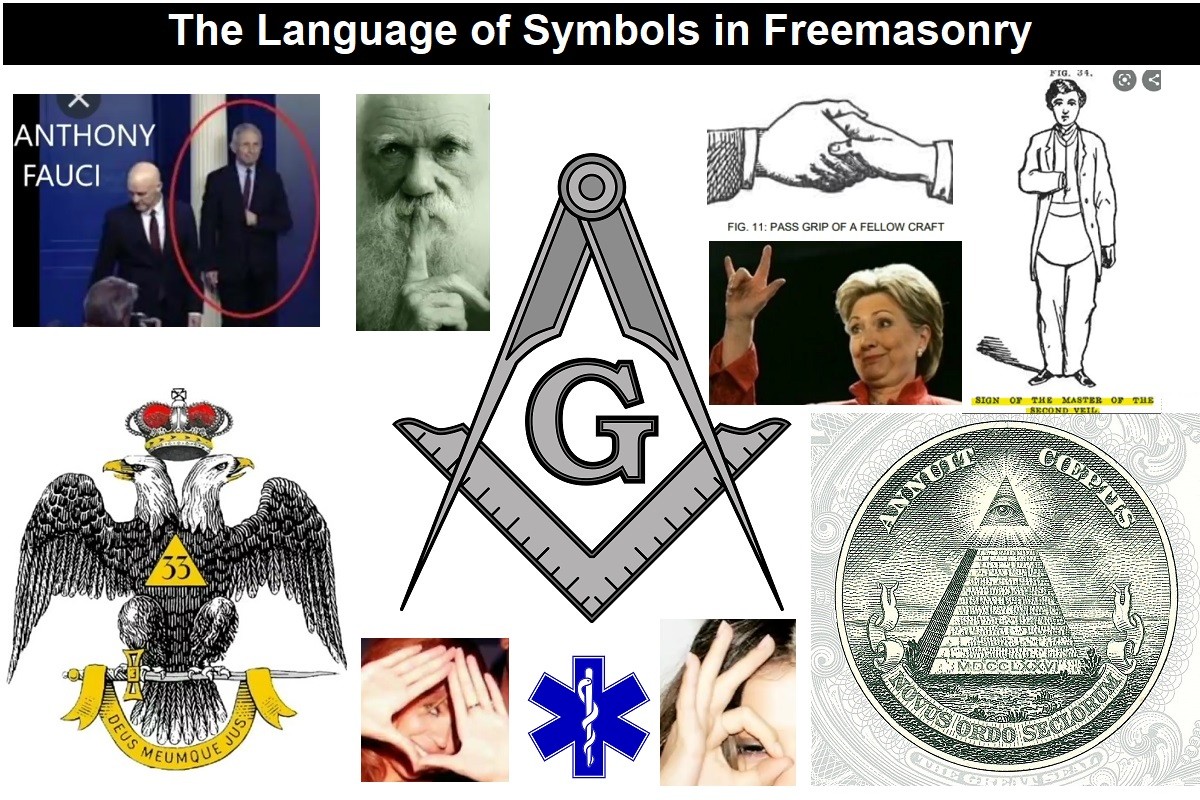
Identifying the Luciferian Globalists Implementing the New World Order – Who are the “Jews”?
Who are the Children of Abraham?
The Brain Myth: Your Intellect and Thoughts Originate in Your Heart, Not Your Brain
Fact Check: “Christianity” and the Christian Religion is NOT Found in the Bible – The Person Jesus Christ Is
Christian Myths: The Bible does NOT Teach that it is Required for Believers in Jesus to “Join a Church”
Young Man Living on the Streets Finds Jesus of the Bible – Overcomes Drug and “Terminally Online” Addictions
COVID “Vaccine” Injured Muslim Man Learns COVID was a Scam and Meets Jesus of the Bible as he Begins to Heal
Was the U.S. Constitution Written to Protect “We the People” or “We the Globalists”? Were the Founding Fathers Godly Men or Servants of Satan?
The Seal and Mark of God is Far More Important than the “Mark of the Beast” – Are You Prepared for What’s Coming?
The United States and The Beast: A look at Revelation in Light of Current Events Since 2020
The Satanic Roots to Modern Medicine – The Mark of the Beast?
Medicine: Idolatry in the Twenty First Century – 8-Year-Old Article More Relevant Today than the Day it was Written
Having problems receiving our emails? See:
How to Beat Internet Censorship and Create Your Own Newsfeed
We Are Now on Telegram. Video channels at Bitchute, and Odysee.
If our website is seized and shut down, find us on Telegram, as well as Bitchute and Odysee for further instructions about where to find us.
If you use the TOR Onion browser, here are the links and corresponding URLs to use in the TOR browser to find us on the Dark Web: Health Impact News, Vaccine Impact, Medical Kidnap, Created4Health, CoconutOil.com.






